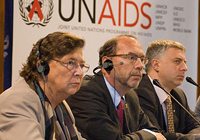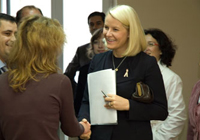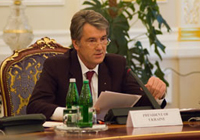
Feature Story
UNAIDS Executive Director and Princess of Norway on AIDS advocacy mission in Ukraine
21 October 2008
21 October 2008 21 October 2008
L to R: Dr Sigrun Mogedal, Ambassador for HIV/AIDS, Ministry of Foreign Affairs, Norway; Dr Peter Piot, UNAIDS Executive Director; Professor Serghiy Kvit, President, Kyiv-Mohyla Academy.
UNAIDS Executive Director Dr Peter Piot and UNAIDS Special Representative, Her Royal Highness Crown Princess Mette-Marit of Norway were in the Ukrainian capital Kiev this week to call for strengthened leadership in the AIDS response in the country which has Europe’s most severe AIDS epidemic.
During their two-day visit in Kiev, Dr Piot and the Crown Princess met with key representatives from government and civil society to support efforts to stop the spread of HIV and address the growing needs of people living with HIV.
Their mission began with a visit to the All-Ukrainian Network of People Living with HIV, which provided a glimpse into the successful involvement of people living with HIV in Ukraine’s response and the challenges that remain.
Dr Piot later addressed the Presidential Council of Ukraine where he commended the country on its progress in responding to AIDS and engaging with civil society including people living with HIV.He recognized President Yushchenko’s unprecedented leadership on AIDS and acknowledged the recent expansion of access to HIV prevention and testing for people who need them most, such as people who inject drugs. He noted the increased numbers of people accessing HIV treatment and the Government’s commitment to make treatment available to all those in need.
President Yushchenko thanked Dr Piot for his leadership in the global response to AIDS, and recognized the contributions of UNAIDS “for its significant support and reliable partnership in addressing the epidemic in Ukraine”.

The Crown Princess Mette-Marit of Norway, UNAIDS Special Representative, greets Ms Natalia Leonchuk, Executive Director, East European and Central Asian Union of PLWH Organizations at the beginning of a meeting with Representatives of All-Ukrainian Network of People Living with HIV. Kyiv, Ukraine 20 October 2008. Credit: UNAIDS/Yuriy Shkoda
Wanting to learn more on young people’s involvement in the country’s AIDS response, the Crown Princess met with a group of young people active in HIV prevention and peer education activities. Together, they shared experiences and thoughts on how best to involve youth and reach this important demographic in Ukraine.
This advocacy visit comes at a critical juncture in Ukraine’s response to AIDS. Latest figures from UNAIDS’ 2008 Report on the global AIDS epidemic estimates some 440,000 people are living with HIV in Ukraine and the adult HIV prevalence of 1.6% is the highest in Europe.
Ukraine’s HIV epidemic is concentrated among people who inject drugs, their sexual partners, sex workers, men who have sex men, and people in prison settings.
In meetings with civil society Dr Piot stressed the urgency to increase coverage and improve quality of prevention programmes among most-at-risk groups. Dr. Piot recognized Ukraine’s leadership in implementing intravenous drug substitution therapy, but stated that these programmes need to be scaled-up more quickly. Equally important is eliminating stigma and discrimination which is a major challenge in Ukraine and elsewhere in Eastern Europe.

Viktor Yushchenko, President of Ukraine addresses the meeting of Coordination Council on HIV/AIDS, Tuberculosis and Illicit Drug Control. Dr Peter Piot, UNAIDS Executive Director also participated in this meeting. Kyiv, Ukraine; 20 October 2008. Credit: UNAIDS/Yuriy Shkoda
The Ukrainian Government has placed youth awareness of AIDS as a national priority. Currently national indicators reveal that just 40% of young people in the country (15-24 years) know how to protect themselves against HIV infection and reject misconceptions about the virus. Unless prevention programmes reaching out to young people are significantly increased in the coming years, Ukraine could fall short of the UNGASS target that by 2010 at least 95% of young people know how to reduce their vulnerability to HIV infection.
Despite the significant progress made, Dr Piot urged national partners to mount an even greater AIDS response that focuses on preventing new HIV infections through the tailoring of prevention efforts to local contexts. To do this, and to meet other vital components of the national response, greater domestic resources will be required to ensure the sustainability of programmes that are currently supported from donors.
Dr Piot encouraged his counterparts in government and civil society to build stronger partnerships among all sectors of Ukrainian society – including the private sector – as a means to scale-up the country’s response to AIDS.
UNAIDS Executive Director and Princess of Norway
Feature stories:
Lars Kallings: UN Special Envoy for AIDS in Eastern Europe and Central Asia (20 October 2008)
Making a difference: UNAIDS in Ukraine (8 January 2008)
Princess of Norway visits grassroots AIDS organization (06 November 2007)
UNAIDS Special Representative, Her Royal Highness Crown Princess Mette-Marit of Norway, launches book “If I kept it to myself” (15 August 2006)
HRH the Crown Princess of Norway visits the UNAIDS Secretariat, Geneva (25 April 2006)
%Speeches:
Speech by Her Royal Highness the Crown Princess Mette-Marit of Norway to Kyiv-Mohyla Academy, Ukraine (21 October 2008)
Delivered on behalf of Her Royal Highness by Dr Sigrun Mogedal, Ambassador for HIV/AIDS, Ministry of Foreign Affairs, Norway.
%External links:
Official Website of Victor Yushchenko, President of Ukraine
Official web site of the Royal house of Norway
%Multimedia:
View photo gallery from this visit to Ukraine



